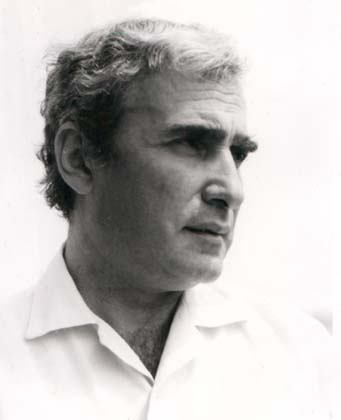 Dumbadze, Nodar Vladimirovich, Soviet Georgian author born on July 14, 1928, in Tbilisi. His father was secretary of the regional Communist Party Committee and was arrested in 1937 as an "enemy of the people". The young Dumbadze was then raised by relatives in the western Georgian village of Khidistavi.
Dumbadze, Nodar Vladimirovich, Soviet Georgian author born on July 14, 1928, in Tbilisi. His father was secretary of the regional Communist Party Committee and was arrested in 1937 as an "enemy of the people". The young Dumbadze was then raised by relatives in the western Georgian village of Khidistavi. Dumbadze went on to earn a degree in economics from Tbilisi State University in 1950. His first poems also appeared in 1950, in a student almanac. After graduation, he worked for a few years at the university as a lab assistant, but continued to pursue writing. In 1956-1957, he published three books of humorous stories. In 1957 he gave up his lab work to immerse himself fully in a literary career. He worked in the editorial departments of various journals and in the screenwriting division of Georgia-Film. He continued to publish humorous stories, including the 1959 collection "Village Boy." He scored a major success with the largely autobiographical novel Me, Grandma, Ilko and Illarion (1960). The novel is set in a Georgian village during the years of the Great Patriotic War. All able-bodied men are off at the war front, leaving only women and elderly men behind. At the center of the story, is a young orphan, his grandmother, and two sharp-tongued but wise and generous elderly neighbors who help watch over the boy. Dumbadze's next novel, I See the Sun (1960), also set in the war years, describes the difficult situation in the villages and the fear people felt for their loved ones who were fighting at the front. In Sunny Night (1967), the hero struggles to find a way to reestablish a connection with his mother, who has just returned from twelve years of exile. In a further complication, the hero must decide whether or not to save the life of the villain who caused his family's ruin. Don't Be Afraid, Mama! (1971) depicts the life of Soviet border guards. Masculine friendships, the tragedy of losing a comrade, and the pain of unrequited love are all addressed in a lyric manner typical of Dumbadze. When preparing this novel, Dumbadze received special permission to serve in a border-patrol unit. White Flags (1973) follows the fate of a someone unjustly convicted of a murder he did not commit. Many of the characters are criminals, whom Dumbadze portrays as struggling with their relationship to society but also with their understanding of themselves. Dumbadze's final novel was Law of Eternity (1978). In this work, a gravely ill hospital patient faces the concept of the struggle between good and evil. The short story "Khelados" tells of a Greek boy who is departing for his historic homeland. But at the last moment, he lacks the strength to part with everything he has known all his life—the town of Sukhumi and his friends. To return, he jumps off the departing steamship, but he dies in the sea. In "Kukaracha", one of Dumbadze's last tales, a policeman takes pity on a criminal, and in the end winds up being killed by a bullet from this same criminal's gun. The story "Blood Knot" tells the story of a boy, who--like the author--was born in 1928 and who--again like the author-- lost his parents in the Great Terror year of 1937 and is sent to live with relatives in the village. Dumbadze joined the Communist Party in 1964. He won numerous awards during his career, including the Rustaveli Prize (highest arts award in Georgia, 1975), the Komsomol Prize (1966) and the Lenin Prize (1980). He was a deputy to the Georgian Supreme Soviet (1971-1978) and to the Supreme Soviet of the USSR (1979-1984). In 1974 he was named a secretary of the Georgian Writers Union, and from 1981 until his death he served as Chairman of the Union. Nodar Dumbadze died in Tbilisi on 14 September 1984. |
Return to: ENCYLOPEDIA OF SOVIET WRITERS
Return to: SovLit.net
editor@sovlit.net
(c) 2012 SovLit.net. All rights reserved.